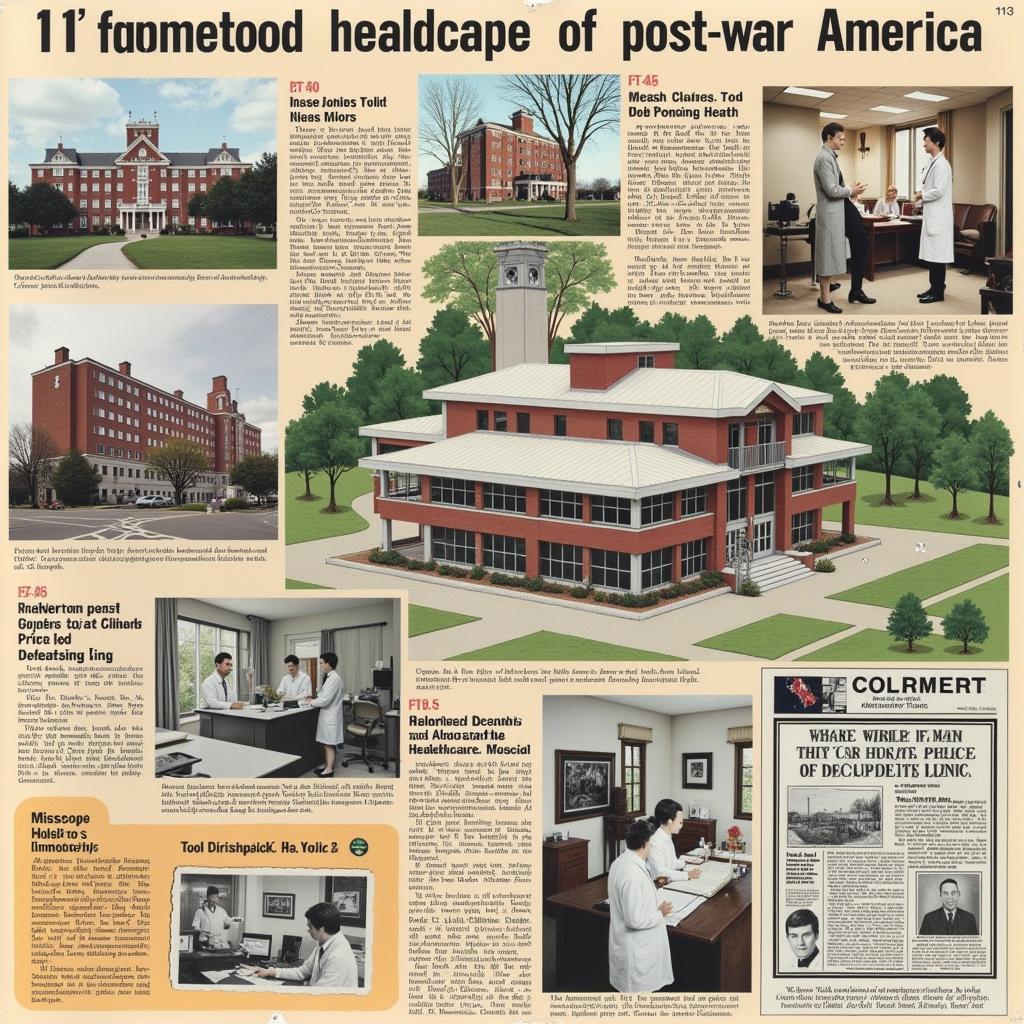Why the US Never Implemented a National Health Care Service After WW2
The United States, despite the widespread implementation of national health care services in other developed nations after World War II, notably the UK’s NHS, charted a different course. This article delves into the complex reasons behind why the US never implemented a national health care service after WW2, exploring the political, economic, and social factors that shaped this unique trajectory.
The Post-War Landscape and the Seeds of Resistance
 Post-War American Healthcare Landscape: Depicting a mix of private hospitals, doctor's offices, and limited public health initiatives, highlighting the fragmented nature of the system.
Post-War American Healthcare Landscape: Depicting a mix of private hospitals, doctor's offices, and limited public health initiatives, highlighting the fragmented nature of the system.
Following World War II, many nations embarked on building comprehensive social safety nets, including national health care. However, in the US, the burgeoning private insurance industry, coupled with a strong belief in free-market principles, began to exert considerable influence. This created a powerful lobby against government intervention in healthcare. Furthermore, the American Medical Association (AMA), fearing a loss of autonomy and income under a nationalized system, actively campaigned against such proposals.
The Cold War and the Spectre of “Socialized Medicine”
The Cold War era further complicated the narrative. National health care, often labeled “socialized medicine,” became associated with communism and socialism. This rhetoric effectively demonized the concept in the eyes of many Americans, making it politically unpalatable. Politicians who dared to champion national health care were often accused of being un-American, further chilling the debate.
The Power of Private Interests and the Rise of Employer-Sponsored Insurance
The post-war economic boom saw a significant expansion of employer-sponsored health insurance. This system, while leaving many uninsured, became deeply ingrained in the American fabric. It tied healthcare access to employment, creating a powerful disincentive for change. Challenging this system meant confronting not only the insurance industry but also major employers who benefited from it.
The Role of Labor Unions and the Missed Opportunity
While some labor unions initially advocated for national health care, they later shifted their focus to securing better employer-sponsored plans for their members. This arguably represented a missed opportunity to build a broader coalition for a universal system.
The Civil Rights Movement and the Fight for Healthcare Equity
The Civil Rights Movement exposed the deep racial disparities in healthcare access, further complicating the debate. While some argued that a national system would address these inequities, others feared that a government-run system might perpetuate existing biases.
Why the US Never Implemented National Health Care After WW2: A Summary
The US’s unique path in healthcare can be attributed to a confluence of factors: a powerful private insurance industry, the AMA’s opposition, Cold War anxieties, the rise of employer-sponsored insurance, and the complex dynamics of the Civil Rights Movement. These factors combined to create a formidable barrier to the implementation of a national health care service, leaving the US with a patchwork system that continues to be a subject of debate and reform efforts.
Conclusion
The question of why the US never implemented a national health care service after WW2 is a multifaceted one with no easy answers. Understanding this history is crucial for navigating the ongoing discussions about healthcare reform and for appreciating the unique challenges and opportunities that lie ahead.
FAQ
- Did any US presidents advocate for national health care after WW2?
- How did the AMA justify its opposition to national health care?
- What role did labor unions play in shaping the US healthcare system?
- How did the Cold War influence public opinion on national health care?
- What are the main differences between the US healthcare system and national health care systems in other developed countries?
- What were the main arguments against a national health care system in the post-war era?
- How did the rise of employer-sponsored insurance impact the push for national health care?
Common Scenarios and Questions:
- Scenario: Someone is researching the history of healthcare in the US and wondering why the country took a different path than other developed nations.
- Question: Why didn’t the US adopt a national health service like the UK after World War II?
Further Reading and Related Topics:
- The history of the American Medical Association
- The development of employer-sponsored insurance
- The impact of the Cold War on domestic policy
- The Civil Rights Movement and healthcare equity
For any assistance, please contact us via WhatsApp: +1(641)206-8880, Email: [email protected] or visit our office at 456 Oak Avenue, Miami, FL 33101, USA. Our customer service team is available 24/7.

